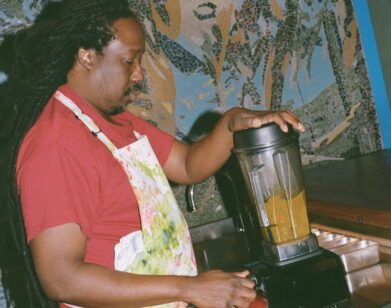Maria Bamford in the Living Room

ABOVE: MARIA BAMFORD. PHOTO COURTESY OF NATALIE BRASINGTON
If making good comedy means taking big risks, Maria Bamford is in the midst of her greatest work. Her new album, Ask Me About My New God, and special, The Special Special Special, delve into Bamford’s history with mental illness, including bipolar disorder, thoughts of suicide, and her time in a psychiatric hospital just last year. Critics and audiences have responded with favorable reviews and sold-out shows, and Bamford has simply kept working, creating and starring in a new webseries, Ask My Mom, appearing in the latest season of Arrested Development, and performing stand-up in venues and festivals across North America, including an upcoming appearance at the New York Comedy Festival tonight, November 8.
We caught up with Maria Bamford at home between gigs. Here, she pauses to reflect on her hectic schedule, performing for her parents, how society regards mental and physical illness, and what she’s waiting for on Netflix.
JAMES OSTIME: You’ve had such a busy year, with the release of your special and your album, your new web series, Arrested Development, and a stand-up tour. Do you like working at this pace?
MARIA BAMFORD: It sounds like it’s a lot when it’s said in a list, but actually more the work of other people. The stand-up special was only one day of work, we shot it in my house. Arrested Development was just a few days shooting. Believe me, I have a lot of time to contemplate and sit around and enjoy the gravy lapping up against my kneecaps.
OSTIME: It seems as your calendar fills and your fan base grows, your instinct is to take a more minimalist approach. The special you released this year is you performing material in your living room for an audience of just two: your mother and father.
BAMFORD: Yeah.
OSTIME: Some of your act is intensely personal and I wonder if an audience of just your parents makes it easier to be so revealing, or if it’s much harder.
BAMFORD: The one thing is my parents have heard all those jokes before, so I knew it was gonna be a tougher crowd. No, not really, they’re super supportive. The only weird thing I sort of forgot is that there’s something wonderful about hearing people laugh.
OSTIME: Sure.
BAMFORD: I did miss that a bit. For me, it was a little painful, it was just like a regular show where there aren’t many people and not many people laughing, but it was tons of fun. My parents thought I did incredibly well, but half the things I’m sure they’re like, “Well I don’t know what she’s talking about.”
OSTIME: Some of the same material in your special shows up in your album, but it was recorded in a comedy club with a large crowd. Some bits that got a few laughs from your folks just kill on the album. What’s more satisfying to you as a performer—a huge laugh from a room full of strangers, or mild chuckles from your parents?
BAMFORD: I think it’s parents. Like, you know, it’s like making a friend laugh. It feels really good. The problem is, my parents won’t support me financially despite the fact that I’m providing this service, making them laugh. [both laugh]
OSTIME: Well, they ought to.
BAMFORD: Yeah, so I’ve gotta hustle with strangers, because they aren’t willing to pay the piper.
OSTIME: You speak candidly in your act about your history with mental illness, including discussing your time spent in a psychiatric hospital last year. When you put this set together, did you struggle with how much to reveal?
BAMFORD: Not really. I’m sure I could have shared more, or gotten more in-depth with it, but I did think, “Well, I want to be relatable on some level.” [laughs] I guess I stayed fairly general, I feel like. I said what I wanted to say, which is the great thing about stand-up. You can say what you want to say.
OSTIME: You have a great bit about how society tends to treat mental illness differently than physical illness. We don’t tell someone with cancer to just buck up and treat themselves to a spa day, for instance. Why do think mental health issues are perceived so differently than physical ones?
BAMFORD: Well, I think there is shame about physical illness, too, though. Even in tribal societies, it’s kind of seen as a blessing or a curse when somebody’s ill. There’s something weird about it, y’know? The idea that something has to be done. I’ve heard of people getting physical illness and then people fall away because they’re frightened of being around someone who is ill. It seems like with mental illness, there’s this attitude that it’s a moral choice. Kind of like the things we used to say about people born with disabilities, “Oh, the Devil is in that person.” It’s passing a moral judgement along with whatever the perceived differences are. And of course there are generally some things you can do to improve your situation, even if it’s just going and getting help. I know I’ve heard so many people in Los Angeles tell me, “Oh, all you have to do is eat this and don’t eat that and eat this at four p.m. and don’t eat that at two a.m. and stuff ice cubes down your pants,” or whatever it is. [both laugh] So I think there is some responsibility of the person to take charge of their physical and mental well-being, but I don’t think it helps at all when people say, “Oh yeah? You’re sick? Guess what, it’s your fault! That’s what I’m here to tell ya.” [both laugh]
OSTIME: Forgive me if this is too personal a question. Some medication prescribed for psychological problems can also affect cognition. You depend on a quick wit and precise memorization and speaking for long stretches in your job as a comedian; have you ever been on medication that has hindered those abilities? How did you deal with it?
BAMFORD: Oh, yeah, yeah. I had a terrible time. I was very vain and didn’t want to go on medication that other members of my family have been on. My mom is bipolar and my aunt has manic depression and they’re both on Depakote, which I didn’t want to go on because it can cause weight gain. So I tried about four different medications, two of which did have cognitive effects where, at least for me, I had difficulty thinking and talking! That was part of the reason I was hospitalized three times last year. It was mostly meds issues, where you’re not only feeling terrible but you’re just not thinking properly either. I was saying words onstage that were pretty close to what I remember writing, but they just weren’t right. I remember telling my psychiatrist, and she hadn’t had any performers as patients, and she just went, “Ohhhh! I didn’t even… Ohh, no!” But it was my fault because of vanity, but now I’m on Depakote, and I did gain some weight, but I feel good, so who gives a shit?
OSTIME: I would imagine that so much of your life is necessarily centered around comedy. You work in comedy clubs, you do films and TV with funny people. Do you find, then, that you gravitate towards dramatic fare when you’re looking to unwind?
BAMFORD: Well, my current joke is that it turns out it is possible on Netflix to run out of genocide documentaries.
OSTIME: [laughs]
BAMFORD: There are some in production, but it turns out you gotta wait out the post. The editing process can take some time, between my queue and wherever it’s happening. Oh, what’s that? It’s happening here in Los Angeles, too? There’s a million people living downtown with no homes or healthcare? Oh. Right. Anyway.
OSTIME: Did you happen to see that doc Lost Angels? About Skid Row?
BAMFORD: Yes!
OSTIME: So interesting, wasn’t it? Heartbreaking.
BAMFORD: Yeah, it’s just ongoing. It’s a city of people, and thank God there are organizations, Downtown Women’s Center and a number of religious organizations trying to help people, but it’s not enough. I think it’s because there’s no money in it. It’s not like breast cancer, where you can sell some yogurt on the side. The people who suffer from mental illness don’t have a lot of extra spending money.
OSTIME: To circle back to the idea that mental health issues are often misunderstood by society, I think there’s a tendency, even among the most well-meaning people, to look at someone who suffers with those illnesses and say, “But you’re better now, right? You’re taking medication and it’s fine, isn’t it?” Have you had that experience? What do you tell people who ask you those questions?
BAMFORD: I guess it’s just like anything. All you can do is hope for the best. Like Michael J. Fox and his new show, that’s so cool! He’s working and not apologizing for being himself, for being the person that he is, and in fact making something that’s more meaningful and relatable to everybody. We can all relate to that. Life is supposed to be suffering, right? Is that Buddhist, I’m not sure. I’m sorry, have I answered your question?
OSTIME: That’s perfect!
BAMFORD: It’s just an ongoing thing, you take care of yourself. For me, I go see a therapist every week, I see a psychiatrist once every three months, I exercise, I see friends, and I don’t work a ton. I used to travel internationally, and I don’t anymore. I just go out a couple of times a month and that’s wonderful. That’s plenty.
MARIA BAMFORD WILL APPEAR AT NYU’S SKIRBALL CENTER AS PART OF THE NEW YORK COMEDY FESTIVAL TONIGHT, NOVEMBER 8.






